英语六级难度快速阅读
六级快速阅读的技巧
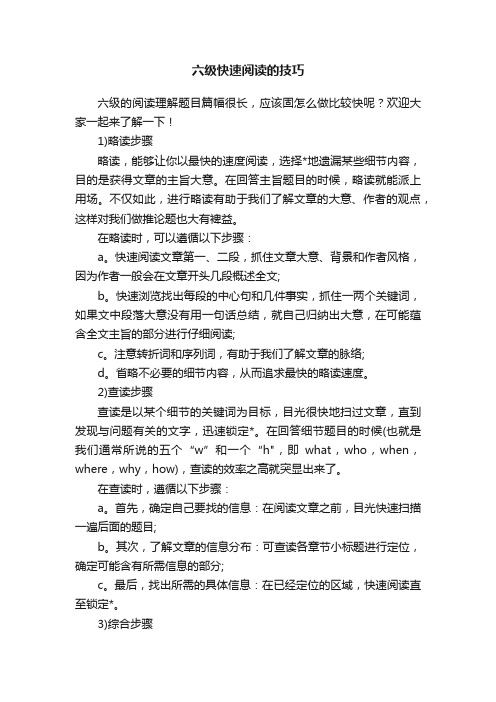
六级快速阅读的技巧六级的阅读理解题目篇幅很长,应该固怎么做比较快呢?欢迎大家一起来了解一下!1)略读步骤略读,能够让你以最快的速度阅读,选择*地遗漏某些细节内容,目的是获得文章的主旨大意。
在回答主旨题目的时候,略读就能派上用场。
不仅如此,进行略读有助于我们了解文章的大意、作者的观点,这样对我们做推论题也大有裨益。
在略读时,可以遵循以下步骤:a。
快速阅读文章第一、二段,抓住文章大意、背景和作者风格,因为作者一般会在文章开头几段概述全文;b。
快速浏览找出每段的中心句和几件事实,抓住一两个关键词,如果文中段落大意没有用一句话总结,就自己归纳出大意,在可能蕴含全文主旨的部分进行仔细阅读;c。
注意转折词和序列词,有助于我们了解文章的脉络;d。
省略不必要的细节内容,从而追求最快的略读速度。
2)查读步骤查读是以某个细节的关键词为目标,目光很快地扫过文章,直到发现与问题有关的文字,迅速锁定*。
在回答细节题目的时候(也就是我们通常所说的五个“w”和一个“h",即what,who,when,where,why,how),查读的效率之高就突显出来了。
在查读时,遵循以下步骤:a。
首先,确定自己要找的信息:在阅读文章之前,目光快速扫描一遍后面的题目;b。
其次,了解文章的信息分布:可查读各章节小标题进行定位,确定可能含有所需信息的部分;c。
最后,找出所需的具体信息:在已经定位的区域,快速阅读直至锁定*。
3)综合步骤快速阅读题不仅需要我们通过查读方法来回答细节题,同时也需要我们运用略读方法回答主旨题和推论题。
因此,我们必须将略读和查读步骤统一起来,综合使用。
归纳起来,应有以下步骤:a。
略读文章前一、二段和各小标题,归纳出文章的主旨;(原略读第一步)b。
目光快速扫描一遍文后题目,回答主旨题,确定其他题目关键词;(原查读第一步)c。
根据关键词,查读各章节小标题,定位可能含有所需细节信息的部分;(综合原查读和略读第二步)d。
英语四六级快速阅读解题技巧

英语四六级快速阅读解题技巧英语四六级快速阅读解题技巧在英语四六级中,阅读乃占分比例较高的部分,拿下阅读的高分,那么离四六级总体的高分也就不远了。
而阅读中的段落信息匹配题,也就是我们通俗来讲的快速阅读,如何用最高效的方法拿下高分呢?下面yjbys网店铺为大家整理了英语四六级快速阅读解题技巧,希望对大家有所帮助。
快速阅读的做题步骤如下:1.看大标题(主要是了解文章大意)2.选定位词3.读文解题4.查漏补缺下面我们来对每个步骤进行详细讲解:一、选定位词相信很多考生经常看到定位词,那么定位词有什么特点呢?怎么选呢?选那些不易替换、文中原样重现的词语,如:•数字、时间•大写专有名词:人名、地名、机构名……•特定概念:合成词、专业概念、独特说法、偏具体的名词二、读文解题扫读,时刻注意定位词的出现•段首、段末•数字、专有名词丰富的区域•段中转折、强调处•识别同义改写注意要核对文题是否一致!三、查漏补缺•先确定来源明显的句子•第一遍无法确定来源的句子,注意结合每段主题、话题词、态度方向筛选(已对应两个句子的段落,可不用再阅读)•一般有约7个句子来源明显下面再为大家总结做题要点,来帮助大家对快速阅读有一个整体的概念。
•不求甚解:重点是看到,而非看懂•先题后文:先定句子定位词•匀速扫读:无需慢速精读,也莫过快略读;保持适中速度,时刻关注对应•有取有舍:优先确定来源明显的句子拓展阅读:英语六级考试阅读高频词汇1.extravagant[ik.str.v.g.nt]a.奢侈的,铺张的;过度的,过分的,放肆2.arrogant[..r.g.nt]a.傲慢的,自大的3.jeopardize[.d.ep.daiz]vt.危及,损害4.retreat[ri.tri:t]vi./n.退却,撤退;规避;隐退(处)5.revolutionary[.rev..lu:..n.ri]a.革命的,革新的n.革命者6.evolutionary[.i:v.'lu:.n.ri]adj. 进化的, 发展的, 演变的`7.missionary[.mi..n.ri]n.传教士8.assault[..s.:lt]vt.(武力或口头上的)攻击,袭击9.delicacy[.delik.si]n.精美;娇弱,微妙10.regenerate[ri.d.en.reit]a.改过自新的,新生的11.celebrate[.selibreit]vt.庆祝;颂扬,赞美vi.庆祝,过节12.rejuvenate[ri'd.u:vineit]v. 使... 年轻, 使... 恢复精神, 变年轻13.integrate[.intigreit]v.(into,with)(使)成为一体,(使)合并14.wander[.w.nd.,.wɑ:n:d.r]vi.漫游,闲逛,漫步;偏离正道;走神mentern. 批评家16.encounter[in.kaunt.]vt./n.遇到,遭遇,遭到17.seminar[.seminɑ:]n.(大学的)研究班,研讨会18.incentive[in.sentiv]n.刺激,鼓励19.disruptive[dis.r.ptiv]a.破坏性的;制造混乱的;捣乱的20.prospective[pr..spektiv]a.预期的,未来的,可能的21.discontented[.disk.n.tentid]a.不满足的,不满意的22.convert[k.n.v.:t,.k.nv.:t]v.(使)转变(化);(使)改变信仰等23.implement[.implim.nt]vt.使生效,履行,实施n.工(器,用)具24.transplant[tr.ns.plɑ:nt,-pl.nt]vt.移栽;移植;使迁移n.(器官)移植25.disorient[dis'.:ri.ent]vt. 使... 失去方向感, 使... 迷惑26.haunt[h.:nt]vt.常出没于;使苦恼;萦绕n.常去的地方27.unprecedented[.n'presid.ntid]adj.空前的, 前所未有的28.prototype['pr.ut.taip]n.原型, 范例, 雏形29.artificial[.ɑ:ti.fi..l]a.人工(造,为)的;假的,模拟的30.fascinatingly[.f.sineiti.li]ad.迷人地31.exceedingly[ik.si:di.li]ad.非常,极其32.profitability[.pr.fit.'bil.ti]n. 收益性, 盈利能力33.intriguingly[in'tri:gi.li]adv. 有趣地, 有魅力地34.validity[v.'liditi]n.合法性, 有效性, 正确性35.disproportionate[.dispr.'p.:..nit]adj.不成比例的, 不相称的, 不均衡的36.enhance[in.hɑ:ns]vt.提高,增加,加强37.reimburse[.ri:im.b.:s]vt.偿还38.reinforce[.ri:in.f.:s]vt.增强,加强,增援39.contradictory[.k.ntr.'dikt.ri]adj. 矛盾的n. 矛盾40.acquisition[..kwi.zi..n]n.取得,获得,习得;获得物41.aggressively[.'gresivli]adv. 侵略地, 攻击地, 有干劲地,主动地。
英语六级快速阅读技巧有哪些

英语六级快速阅读技巧有哪些英语六级是大多数大学生会考的一种英语考试,英语六级考试中包含了很多考试内容,其中就有阅读,阅读可以说是比较难的一部分,那你知道英语六级快速阅读技巧主要有哪些吗?下面是小编给大家整理的英语六级快速阅读技巧有哪些_英语六级快速阅读有什么技巧,欢迎大家借鉴与参考,希望对大家有所帮助。
英语六级快速阅读技巧1.阅读题目以预测文章内容应该先读题目,后看文章,同时根据题目设想一下文章可能涉及的内容,以及所使用的词汇量的类型与范围,乃至题目涉及到的关键性的词汇。
诸如,大写字母,时间,数字等用词,这些词汇都是在阅读文章查询信息过程中重要的提示。
2.重视小标题在文中的纲要性作用在篇幅相对比较短的阅读理解考试当中可以直接用题目中的关键词汇定位,但是面对长篇累牍的快速阅读,考生首先应当留意文章中是否有小标题。
如果有,一定要先读小标题,因为小标题的作用如同字典前面的目录,可以帮助考生宏观的把握文章框架,迅速寻找到有效信息的范围。
3. 注意标点符号的使用可以运用标点符号(破折号、小括号、冒号)了解抽象的和不认识的词汇或句子的含义。
因为这些标点符号的出现就是为了更进一步地解释其前面的信息。
但同时,由于快速阅读用词相对比较简单,很容易理解和把握标点前的被解释信息,所以,可以将这些标点符号后面的信息删除,从而更加快速地把握文章主旨,提高阅读速度及效率。
4. 注意逻辑关系的运用逻辑关系分布在文章的句子内部、句与句之间、以及段落之间,最基本的逻辑关系有以下几种:(1) 因果关系:as a result, therefore, hence, consequently, because, for, due to, hence, 等等。
(2) 并列、递进关系:and, or, then, what's more, in addition, besides, in other words, moreover等等。
2022年六级英语考试快速阅读各题型临场指导

2022年六级英语考试快速阅读各题型临场指导距离高校英语六级考试还有不足一个月的时间,笔者给临战的考生伴侣们一些建议。
盼望能通过本文帮大家梳理一个头绪,在最终的备战中尽量做到有的放矢,弹无虚发。
一、快速阅读。
高校六级中的第一道阅读题目是快速阅读,许多考生伴侣都向笔者反映:快速阅读怎么做啊?拿到题目是先看文章还是先看题目啊?怎么我总是做不完题啊?有什么方法可以提高阅读速度啊?等等等等这几个问题认为正确而不怀疑也是大家最关怀的,那接下来,笔者将从六级快速阅读的命题特征,做题步骤,解题方法几个角度来谈谈如何攻克快速阅读。
1.六级快速阅读的命题特征。
六级快速阅读的文章篇幅约为1200单词,通常是略多一些的,整个题目的给定时间为15分钟。
文章之后是十道题目,这十题可以会消失两种组合:一种为4道是非推断题(也就是大家所熟识的Y/N/NG题)加上6道句子填空题(也可称补全句子);另一种为7道选择题加上3道句子填空题。
至于考试最终会以哪种形式出题,在考纲中是没有明确说明的,从改革之后的几次实考状况来看,06年12月六级开头使用新题型,到09年6月的六级考试中,第一种题目组合形式考了两次,分别是06年12月和07年6月;其次种题目组合形式考了之后的四次。
大家可以从以上的信息中来安排自己对于每种题型的复习时间。
2.六级快速阅读的做题步骤。
由于整个快速阅读部分总体时间为15分钟,假如不进行合理的规划,这样的时间是肯定不够用的。
许多考生伴侣会问究竟应当以一种什么样的挨次来做题?我们先来了解一下在考试大纲中的说法:要求考生运用略读和查读的技能从篇章中猎取信息。
略读考核同学通过快速阅读猎取文章主旨大意或中心思想的力量,阅读速度约为每分钟120词。
查读考核同学利用各种提示,如数字、大字单词、段首或句首词等,快速查找特定信息的力量。
从考纲中我们发觉,这里有三个重点信息:略读、查读、速度为120词/分钟。
从这三点上我们基本上可以的确整体的步骤了,那就是选定信息+回到文章查找信息+对比解题。
六级快速阅读技巧
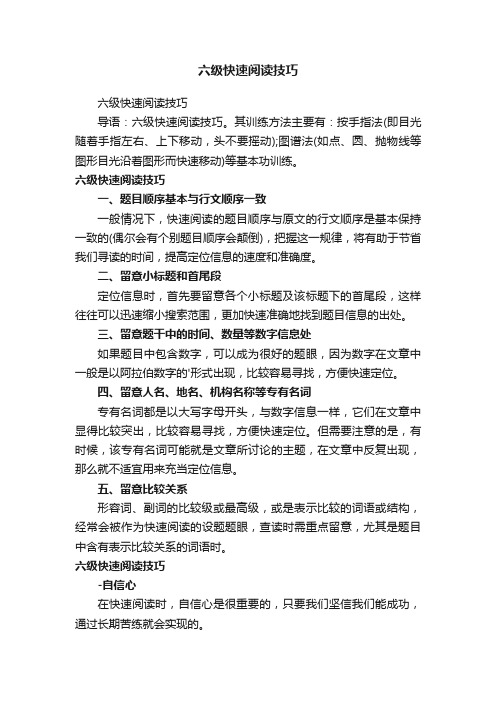
六级快速阅读技巧六级快速阅读技巧导语:六级快速阅读技巧。
其训练方法主要有:按手指法(即目光随着手指左右、上下移动,头不要摇动);图谱法(如点、圆、抛物线等图形目光沿着图形而快速移动)等基本功训练。
六级快速阅读技巧一、题目顺序基本与行文顺序一致一般情况下,快速阅读的题目顺序与原文的行文顺序是基本保持一致的(偶尔会有个别题目顺序会颠倒),把握这一规律,将有助于节省我们寻读的时间,提高定位信息的速度和准确度。
二、留意小标题和首尾段定位信息时,首先要留意各个小标题及该标题下的首尾段,这样往往可以迅速缩小搜索范围,更加快速准确地找到题目信息的出处。
三、留意题干中的时间、数量等数字信息处如果题目中包含数字,可以成为很好的题眼,因为数字在文章中一般是以阿拉伯数字的'形式出现,比较容易寻找,方便快速定位。
四、留意人名、地名、机构名称等专有名词专有名词都是以大写字母开头,与数字信息一样,它们在文章中显得比较突出,比较容易寻找,方便快速定位。
但需要注意的是,有时候,该专有名词可能就是文章所讨论的主题,在文章中反复出现,那么就不适宜用来充当定位信息。
五、留意比较关系形容词、副词的比较级或最高级,或是表示比较的词语或结构,经常会被作为快速阅读的设题题眼,查读时需重点留意,尤其是题目中含有表示比较关系的词语时。
六级快速阅读技巧-自信心在快速阅读时,自信心是很重要的,只要我们坚信我们能成功,通过长期苦练就会实现的。
-集中注意力快速阅读的同时还要求快速记忆,这就要求在阅读过程中除了读,还要记和理解,这时不集中注意力是很难保证“速读”的完成。
-快速理解这是快速阅读的催化剂,就是利用已有的知识经验,去获得新的知识经验,并把新的知识经验纳入已有的知识经验系统中。
要快速理解,就要运用推断法,即能根据几个单词推断出一个句子,由句子推知整个段落的意思。
由于这种推断,眼睛才能停顿到最有信息含义的地方上,这就需要学会略过一些无关紧要的词汇。
大学英语六级考试快速阅读训练(1篇)

大学英语六级考试快速阅读训练(1篇)大学英语六级考试快速阅读训练 1一、快速阅读简介大学英语六级考试中的快速阅读题型是大学英语六级考试__后,在2007年6月首次出现的一个题型。
它要求考试者在15分钟之内阅读一篇英语文章,大约为1200词左右,回答10个问题,并且填涂答题卡的时间也包括在这15分钟之内。
通过对07年6月到09年12月的六份大学英语六级考试真题进行分析,快速阅读的内容比较杂,如07年6月是“Seven Steps to a More Fulfilling Job”,07年12月是“Seven Ways to Save the World”,08年6月为“What will the world be like in fifty years?”,08年12月是“Supersize Surprise”,09年6月是“Helicopter Moms vs.Free-Range Kids”,09年12月是“Bosses Say ‘Yes’ to Home Work”。
阅读后,要了解文章的大意,并能找出所需细节。
六份试题中有三份的第一个问题就是有关文章大意的,如08年6月第一个问题是“What is John Ingham’s report about?”,08年12月的第一问题是“What is the passage mainly about?”,09年12月的第一个问题又是“What is the main topic of this passage?”。
二、快速阅读的训练在快速阅读过程中要突出“快速”二字,这是区别于普通阅读的关键。
在阅读过程中,要一目十行,不能纠缠于文章中的某一细节,如果有的内容看不懂,先不用管它,要一直往下读,要以掌握文章的主要内容和中心思想为主,这样才能达到快速阅读的目的。
如果这一难懂的内容是自己确实要弄懂的问题,那么看完文章后,可以返回到这一段再仔细阅读。
在六级考试中,如是后面的问题与这一内容有关,再认真阅读也不迟。
英语六级阅读理解速读方法

英语六级阅读理解速读方法英语六级考试的阅读理解部分对于很多考生来说是一个难题,因为其中不仅包含了大量的生词和长难句,还需要考生运用灵活的阅读策略来解答问题。
为了帮助考生提高阅读理解的速度和准确性,本文将介绍一些有效的速读方法。
一、快速浏览对于一篇英语阅读材料,首先应该进行快速浏览。
快速浏览可以帮助考生了解文章的大致内容和结构,从而减少阅读时间和提高阅读效率。
快速浏览时,不需要仔细阅读每个单词,只需注意文章的标题、段落中的主题句和结论句等关键信息。
二、查找关键词在阅读理解时,经常会遇到一些生词或者不熟悉的词汇,这时候可以使用查找关键词的方法来更快地理解文章。
查找关键词是指在阅读过程中,快速扫描文章中的单词,找到与问题相关的关键词,并根据关键词的意思来推测答案的位置。
三、注意上下文关联上下文关联是指在阅读理解过程中,注意文章中句子和段落之间的联系和逻辑关系。
通过理解句子和段落之间的上下文关联,可以更准确地理解文章的意思,帮助解答问题。
例如,可以根据上下文确定词汇的意思,根据前后句子的关系判断句子的含义等。
四、略读段落在解答阅读理解问题时,可以采用略读段落的方法。
略读段落是指快速阅读段落的开头和结尾,以及每个段落的第一句和最后一句,通过这些关键句来推测段落的主题和中心思想,从而帮助解答问题。
五、练习时限为了提高阅读理解的速度,考生在备考过程中可以进行限时练习。
在规定的时间内完成一篇阅读材料的阅读和问题的解答,可以锻炼考生的临场应变能力和答题速度,提高解题效率。
六、积累词汇和阅读素材英语阅读理解的速读技巧需要在长期的积累和实践中提高,因此考生应当注重积累词汇和阅读素材。
通过大量的阅读和词汇记忆,可以提高对词汇的理解和运用能力,从而更快地理解阅读材料。
七、划重点和做笔记在阅读理解过程中,考生可以使用划重点和做笔记的方法来帮助记忆和理解文章。
可以将关键词、重要信息和自己的想法用笔记形式记录下来,以备后续的复习和回顾。
英语六级技巧之快速阅读
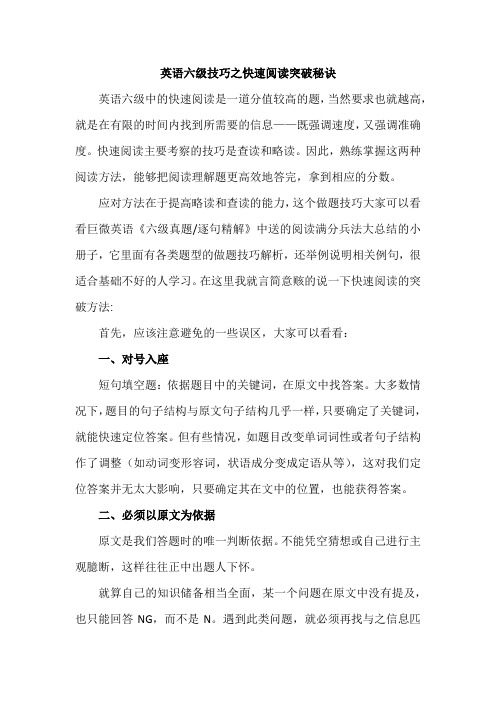
英语六级技巧之快速阅读突破秘诀英语六级中的快速阅读是一道分值较高的题,当然要求也就越高,就是在有限的时间内找到所需要的信息——既强调速度,又强调准确度。
快速阅读主要考察的技巧是查读和略读。
因此,熟练掌握这两种阅读方法,能够把阅读理解题更高效地答完,拿到相应的分数。
应对方法在于提高略读和查读的能力,这个做题技巧大家可以看看巨微英语《六级真题/逐句精解》中送的阅读满分兵法大总结的小册子,它里面有各类题型的做题技巧解析,还举例说明相关例句,很适合基础不好的人学习。
在这里我就言简意赅的说一下快速阅读的突破方法:首先,应该注意避免的一些误区,大家可以看看:一、对号入座短句填空题:依据题目中的关键词,在原文中找答案。
大多数情况下,题目的句子结构与原文句子结构几乎一样,只要确定了关键词,就能快速定位答案。
但有些情况,如题目改变单词词性或者句子结构作了调整(如动词变形容词,状语成分变成定语从等),这对我们定位答案并无太大影响,只要确定其在文中的位置,也能获得答案。
二、必须以原文为依据原文是我们答题时的唯一判断依据。
不能凭空猜想或自己进行主观臆断,这样往往正中出题人下怀。
就算自己的知识储备相当全面,某一个问题在原文中没有提及,也只能回答NG,而不是N。
遇到此类问题,就必须再找与之信息匹配的段落进行查校,根据文段意思进行合理推断从而得出合理的答案。
三、注意修饰性词汇在回答细节题的时候,题目经常会使用修饰性的词汇。
在时间有限的压力下,大家经常会匆匆掠过答案所在的段落,来不及仔细分析其中的确切含义。
因此,当出现像but,otherwise,because,refer to 等词的时候,大家要高度警惕。
大部分的情况下,出现这些词的细节题答案是N,当然并非绝对。
要细心核对段落衔接大意是否符合文章主旨,这样排查答案就比较妥当。
四、平时训练在平时训练快速阅读时,除了灵活运用查读和略读技巧之外,还要有意识地训练自己的短期记忆能力。
英语六级考试阅读速度训练

英语六级考试阅读速度训练英语六级考试对于许多学生来说是一个相当重要的挑战。
其中,阅读理解部分的速度和准确性对考试成绩有着重要的影响。
因此,如何提高阅读速度成为了备考的关键。
本文将介绍一些有效的英语六级阅读速度训练方法,帮助考生在有限的时间内更好地完成考试。
一、选择合适的材料选择合适的阅读材料是提高阅读速度的第一步。
备考过程中,可以通过在相关报纸、杂志和网站上搜索英语六级阅读材料,熟悉考试形式,并适应其中的阅读速度和难度。
二、快速预览在阅读大段英文文章之前,快速预览是提高阅读速度的关键。
通过仔细阅读题目、副标题以及段落开头和结尾的句子,可以帮助理解文章结构和提高阅读效率。
同时,不要在预览阶段纠结于生词或短语,以免浪费时间。
三、提高词汇量在英语六级考试中,词汇量的积累直接关系到阅读速度和理解能力。
在备考期间,考生可以通过背单词、阅读英文文章、听力练习等多种方式来提高自己的词汇量。
并将积累的单词适时应用到阅读理解中,加深记忆。
四、跳读技巧对于长篇文章,采用跳读技巧可以提高阅读速度。
跳读即不需要按照顺序阅读全部内容,而是通过快速浏览段落首尾句、关键词等,获取文章主旨和要点。
同时,学会根据问题定位关键信息,有针对性地阅读,避免浪费时间在无关的细节上。
五、练习模拟考试进行模拟考试是提高阅读速度的重要方式。
通过参加真实的六级模拟考试,考生可以熟悉考试形式和时间限制,培养出较好的应试心态,并在实践中不断提高阅读速度和准确性。
六、划分阅读时间在考试过程中,合理划分阅读时间是至关重要的。
如果遇到较短的文章,可以在预览后直接阅读并回答问题;对于较长的文章,可以根据段落进行分段处理,合理安排时间以提高效率。
七、理解文章结构理解文章结构是提高阅读速度的重要因素。
通过学习文章的段落结构、句子连接方式等,可以更好地理解文章的逻辑关系,从而提高阅读效率,准确把握文章的主旨和要点。
八、阅读经典作品除了备考材料外,阅读一些经典的英文作品也能够提高阅读速度和理解能力。
英语六级阅读理解解题技巧

英语六级阅读理解解题技巧英语六级阅读理解是考试中相对较难的一部分,需要考生具备一定的解题技巧和策略。
本文将介绍一些在解答六级阅读理解题时可以使用的技巧和方法。
一、审题和浏览文章在开始解答之前,首先需要仔细审题,了解题目要求和问题的关键信息。
同时,在阅读文章之前,浏览文章中的标题、题注、字体加粗、倾斜等视觉提示,对文章的结构和主题有基本了解。
二、略读和扫读略读是指快速阅读文章,获取整体了解。
通常可以通过读第一句话、每个段落的第一句话、文章的第一段和最后一段等方式,迅速抓住文章的主题、大意和行文结构。
扫读是指快速寻找特定信息或关键词。
在具体解答题目时,可以通过扫读找出与问题相关的句子或段落,以便更加准确地回答问题。
三、注意关键词和修饰词解答阅读理解题时,关键词和修饰词是非常重要的线索。
关键词可以帮助我们理解文章内容、找到答案,而修饰词则可以帮助我们判断句子的意义和方向。
四、注意转折和连接词在阅读理解中,转折和连接词如however、but、therefore等起到了连接和衔接上下文的作用。
对于这些词,我们要注意它们所表示的关系和逻辑,以便更好地理解文章内容。
五、通读全文和细节题在解答具体细节题时,需要通读全文,全面了解文章的内容和结构。
同时,特别注意题目中给出的具体信息,通过独立思考和推理,找到正确答案。
六、排除干扰选项有时候在选项中会出现和文章中某些细节相关但又不完全符合题目要求的干扰选项。
对于这些干扰选项,我们需要通过仔细阅读或者对比排除的方式,找出正确答案。
七、备选答案与题目对应在填写答题卡时,需要特别注意题号和选项号之间的对应关系,避免填写错误。
同时,还要确保所选择的答案是否与题目要求完全一致。
八、做题时间安排六级阅读理解一般会给出相对充裕的时间。
因此,要合理安排做题时间,先解答那些自信度较高且答案较容易找到的题目,以便在时间有限的情况下,能够尽可能地解答更多的题目。
总结:通过以上的技巧和方法,相信大家可以在英语六级阅读理解中有所突破。
英语六级考试阅读速度提升方法

英语六级考试阅读速度提升方法阅读是英语六级考试中非常重要的一个部分,阅读速度的提升能够帮助考生更好地完成考试。
下面将介绍几种提高英语六级考试阅读速度的方法。
一、拓展词汇量丰富自己的词汇量是提高阅读速度的关键。
为了增加词汇量,我们可以通过背单词、阅读英文原版书籍、听英语广播等方式进行学习。
在阅读过程中,词汇量的充足会使得阅读更顺畅,减少了查词典的时间。
二、练习扫读扫读是在较快速度下阅读文章,抓住关键信息的一种阅读技巧。
练习扫读可以通过定时练习来提高速度,开始可以先从短篇文章开始,慢慢地增加篇幅和难度,提高自己的阅读速度。
三、不要停顿在阅读时,很多人习惯性地在每个句子之间停顿,这样会导致阅读速度变慢。
要尽量减少停顿,通过训练使句子与句子之间流畅连接,这样可以提高整体的阅读速度。
四、忽略细节在阅读过程中,一些细枝末节的细节并不是非常重要。
要学会抓住文章的关键信息,忽略一些不重要的细节内容。
这样可以加快阅读速度,提高阅读效率。
五、了解文章结构在阅读前,可以先了解文章的结构,包括标题、副标题、段落分布等。
这样有助于理清文章的逻辑关系,更好地理解文章的主旨和观点。
了解文章结构能够帮助阅读者快速定位信息和扫读文章。
六、增强阅读理解能力阅读理解是六级考试中的难点,提高阅读理解能力可以帮助快速理解文章。
可以通过做练习题、参加阅读训练班等方式来增强自己的阅读理解能力。
七、养成阅读习惯要提高阅读速度,养成良好的阅读习惯是必要的。
比如,选择合适的阅读环境、避免分心、经常读英文原版书籍等。
只有坚持不懈地练习,才能提高英语阅读速度。
总结:提高英语六级考试阅读速度需要付出一定的努力,但是通过合适的方法和持之以恒的训练,阅读速度是可以得到提升的。
拓展词汇量、练习扫读、减少停顿、忽略细节、了解文章结构、增强阅读理解能力和养成阅读习惯等方法都是有效的。
希望考生们可以通过这些方法提高自己的英语六级阅读速度,取得好成绩。
英语六级阅读突破方法

英语六级阅读突破方法英语六级阅读是许多考试中最具挑战性的部分之一。
即使是英语水平较好的人也可能在六级阅读中遇到困难。
然而,通过一些有效的方法,我们可以突破这一难关,提高我们的阅读能力。
本文将介绍一些有效的英语六级阅读突破方法。
方法一:扩大词汇量在英语阅读中,词汇非常重要。
具有广泛词汇量的人更容易理解文章的整体意思。
因此,我们应该努力扩大自己的词汇量。
这可以通过阅读更多的英语文章和课外书籍来实现。
在阅读过程中,我们可以使用词典来查找我们不熟悉的单词,并尝试记住它们的意思和用法。
方法二:提高阅读速度英语六级阅读的时间限制非常严格,所以我们需要提高阅读速度。
一个有效的方法是通过练习阅读来增加阅读速度。
可以选择一些短篇文章来阅读,并尝试在规定的时间内完成阅读。
同时,我们必须学会快速浏览文章并提取出关键信息。
这样我们就可以更高效地阅读,更多地理解文章的内容。
方法三:理解文章结构阅读英语文章时,理解文章结构是非常重要的。
文章结构可以帮助我们更好地组织信息,使我们更容易理解整篇文章的意思。
在阅读过程中,我们可以关注段落之间的连接词和过渡词,以帮助我们理解作者之间的逻辑关系。
此外,我们还可以注意文章的主题句和重点句,以更好地把握文章的关键信息。
方法四:做练习题做练习题是提高阅读能力的有效方法。
可以通过刷习题来熟悉各种题型和解题技巧。
可以选择一些真实的六级阅读题目,按照考试条件进行练习。
在做题过程中,我们应该注意解题的方法和技巧,并记录下容易出错的地方,以便后续复习。
方法五:背诵模板句型和常用短语在英语六级阅读中,模板句型和常用短语非常有用。
背诵一些常用的句型和短语,可以帮助我们更快地理解文章的意思。
例如,一些表示因果关系、对比关系和总结的表达方式。
背诵这些句型和短语,并在阅读中灵活运用它们,可以提高我们的阅读理解能力。
方法六:注重阅读技巧在英语六级阅读中,一些阅读技巧也非常重要。
例如,猜词义的技巧可以帮助我们从上下文推断出词的意思。
英语六级快速阅读技巧
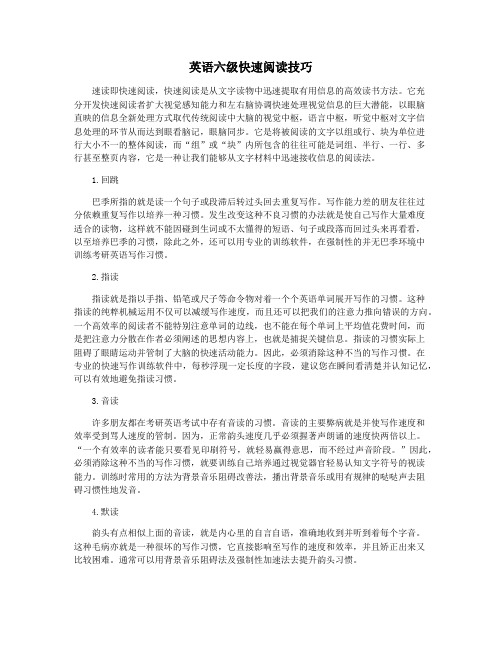
英语六级快速阅读技巧速读即快速阅读,快速阅读是从文字读物中迅速提取有用信息的高效读书方法。
它充分开发快速阅读者扩大视觉感知能力和左右脑协调快速处理视觉信息的巨大潜能,以眼脑直映的信息全新处理方式取代传统阅读中大脑的视觉中枢,语言中枢,听觉中枢对文字信息处理的环节从而达到眼看脑记,眼脑同步。
它是将被阅读的文字以组或行、块为单位进行大小不一的整体阅读,而“组”或“块”内所包含的往往可能是词组、半行、一行、多行甚至整页内容,它是一种让我们能够从文字材料中迅速接收信息的阅读法。
1.回跳巴季所指的就是读一个句子或段滞后转过头回去重复写作。
写作能力差的朋友往往过分依赖重复写作以培养一种习惯。
发生改变这种不良习惯的办法就是使自己写作大量难度适合的读物,这样就不能因碰到生词或不太懂得的短语、句子或段落而回过头来再看看,以至培养巴季的习惯,除此之外,还可以用专业的训练软件,在强制性的并无巴季环境中训练考研英语写作习惯。
2.指读指读就是指以手指、铅笔或尺子等命令物对着一个个英语单词展开写作的习惯。
这种指读的纯粹机械运用不仅可以减缓写作速度,而且还可以把我们的注意力推向错误的方向。
一个高效率的阅读者不能特别注意单词的边线,也不能在每个单词上平均值花费时间,而是把注意力分散在作者必须阐述的思想内容上,也就是捕捉关键信息。
指读的习惯实际上阻碍了眼睛运动并管制了大脑的快速活动能力。
因此,必须消除这种不当的写作习惯。
在专业的快速写作训练软件中,每秒浮现一定长度的字段,建议您在瞬间看清楚并认知记忆,可以有效地避免指读习惯。
3.音读许多朋友都在考研英语考试中存有音读的习惯。
音读的主要弊病就是并使写作速度和效率受到骂人速度的管制。
因为,正常韵头速度几乎必须握著声朗诵的速度快两倍以上。
“一个有效率的读者能只要看见印刷符号,就轻易赢得意思,而不经过声音阶段。
”因此,必须消除这种不当的写作习惯,就要训练自己培养通过视觉器官轻易认知文字符号的视读能力。
六级中的阅读理解题如何提高答题速度和准确率

六级中的阅读理解题如何提高答题速度和准确率在六级英语考试中,阅读理解题一直是考生们的难点和痛点之一。
要在有限的时间内高效地阅读并准确回答问题,需要一些技巧和方法。
本文将提供一些建议,帮助考生们提高在六级中的阅读理解题答题速度和准确率。
一、预览题目在开始阅读文章之前,先浏览一遍题目。
这有助于理解文章的主题和大意,同时也能帮助你在阅读时更有目的性地寻找关键信息。
二、找出关键信息阅读理解题往往会提问关于文章细节、事实、态度或者观点的问题。
在阅读时,要做到快速找出关键信息,包括人物、时间、地点等,并可以做一些标记来帮助记忆。
这样当回答问题时,你可以更容易地定位到相应的信息。
三、注意关系词文章中常出现一些关系词,如however, therefore, but等。
这些词可以帮助你理解文章的逻辑关系和作者的态度。
当遇到这些词时,要留意它们所连接的句子,以便更好地理解文章。
四、练习快速阅读提高阅读速度是提高阅读理解题答题速度的关键。
你可以通过阅读速度训练来提高自己的阅读速度。
刚开始阶段可以通过设置时间限制,进行有针对性的训练,逐渐提高自己的阅读速度。
五、多做模拟题做更多的模拟题可以提高你的答题技巧和反应速度。
通过做题,你可以更好地了解出题规律和考点,从而更好地应对实际考试。
六、积累词汇和阅读材料阅读理解题往往涉及到一些比较专业或者复杂的词汇和句型。
平时要多积累词汇,提高自己的词汇量。
同时,多阅读各类英文材料,如英文报纸、杂志、小说等,以提高自己的阅读能力和理解能力。
七、切忌死记硬背虽然词汇的积累很重要,但在解答阅读理解题时,切忌只依靠记忆。
要学会通过上下文理解词汇的含义,理解文章的意思。
八、注意选项表达方式在回答问题时,要认真阅读选项,并注意选项的表达方式。
有时,选项可能会出现近义词替换、同义词替换等情况。
要仔细辨认,选出正确答案。
通过以上的学习和实践,相信大家可以在六级英语考试中提高阅读理解题的答题速度和准确率。
英语六级快速阅读的小技巧
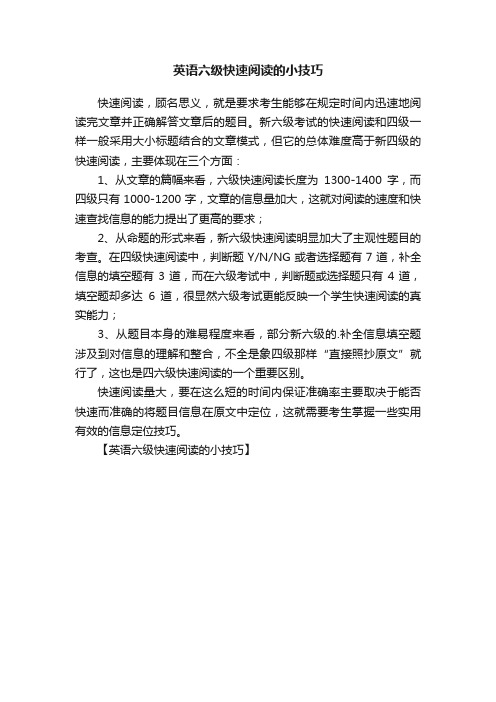
英语六级快速阅读的小技巧
快速阅读,顾名思义,就是要求考生能够在规定时间内迅速地阅读完文章并正确解答文章后的题目。
新六级考试的快速阅读和四级一样一般采用大小标题结合的文章模式,但它的总体难度高于新四级的快速阅读,主要体现在三个方面:
1、从文章的篇幅来看,六级快速阅读长度为1300-1400字,而四级只有1000-1200字,文章的信息量加大,这就对阅读的速度和快速查找信息的能力提出了更高的要求;
2、从命题的形式来看,新六级快速阅读明显加大了主观性题目的考查。
在四级快速阅读中,判断题Y/N/NG或者选择题有7道,补全信息的填空题有3道,而在六级考试中,判断题或选择题只有4道,填空题却多达6道,很显然六级考试更能反映一个学生快速阅读的真实能力;
3、从题目本身的难易程度来看,部分新六级的.补全信息填空题涉及到对信息的理解和整合,不全是象四级那样“直接照抄原文”就行了,这也是四六级快速阅读的一个重要区别。
快速阅读量大,要在这么短的时间内保证准确率主要取决于能否快速而准确的将题目信息在原文中定位,这就需要考生掌握一些实用有效的信息定位技巧。
【英语六级快速阅读的小技巧】。
六级英语快速阅读的技巧

六级英语快速阅读的技巧六级英语快速阅读的技巧六级英语快速阅读的技巧英语六级快速阅读方法一、考前:背四六级高频词汇众所周知,词汇是一切英语考试的基础。
但是望着那本厚厚的英语词典,有几个人能有把握啃完?大多数人绝对属于望而却步型。
我的建议是:同学们去买一本四六级高频词汇手册,每天啃个2~3页的,应付考试也就基本ok了。
当然,有余力或者想挑战高分的同学可以去再找些高频词以外的词汇来背。
英语六级快速阅读方法二、考前:训练泛读技能很多同学都反映考试时间给的太少,来不及完成,从而造成失分。
而这主要是由于大家平时疏忽练习这一部分。
那么应该如何练就这本事呢?我的建议是:大家可以每天去图书馆看些历年英语四级快速阅读真题以及历年英语六级快速阅读真题的.文章等等。
刚开始,可以不用做到一目十行,只要做到看完一篇很长的文章后知道其大体内容是什么。
渐渐地,你会发现你采集信息的能力在加强,而且速度也有稍微提升。
紧接着,你就可以用手机、手表等计时工具来看看自己在多少时间内读完一篇1200左右的英文文章,记下第一次读文花多少时间,以后就算每天只是进步一秒钟,那也是一种进步,欲速则不达嘛!这里当然也存在一个问题,就是文章可能难度不一,相差个几十秒也是正常的,但最好不要超过一分钟,我们要追求一个稳定性。
之后,等你差不多练到能在12分钟左右看完一篇1200字的文章了,你就基本成功了!英语六级快速阅读方法三、考中:快速阅读技巧任何考试都存在一定技巧,但前提必须是同学们做足考前功夫。
我们都知道一篇文章的重点信息一般包含在段落的首末句,主题内容一般是包含在首段和末段。
首末句可能就是段落内容的概括句。
而首段和末段则是整篇文章的导语和总结。
所以看文章时,着重看一下首末段和首末句。
还有一个技巧适合那些善于抓取信息点的同学,即先浏览题干,再去针对性地看原文,从中定位答案,这样做有时候可以省一些时间。
英语六级快速阅读方法四、考中:精神要紧张起来快速阅读是一项重脑力活,要求考生高度集中自己的注意力,不然的话,文章一遍看过去,不知道自己看了什么。
[六级快速阅读的技巧有哪些]如何快速阅读的技巧
![[六级快速阅读的技巧有哪些]如何快速阅读的技巧](https://img.taocdn.com/s3/m/80aa2d3508a1284ac9504375.png)
[六级快速阅读的技巧有哪些]如何快速阅读的技巧自六级改革以来,阅读部分新增了快速阅读。
快速阅读部分采用1-2篇较长篇幅的文章或多篇短文,总长度约为1000到1200词。
要求考生运用略读和查读的技能从篇章中获取信息。
略读考核学生通过快速阅读获取文章主旨大意或中心思想的能力,阅读速度约每分钟120词。
查读考核学生利用各种提示,如数字、大写单词、段首或句首词等,快速查找特定信息的能力。
快速阅读部分采用的题型包括是非判断、句子填空、完成句子等。
很多考生拿到题目感到迷惑,是先看文章还是先看题目?大多数同学总觉得文章太长,题目做不完。
接下来,我将从快速阅读的常考考点以及解题技巧来谈谈如何攻克快速阅读。
快速阅读常考考点归纳:1.篇首、篇尾、段落中主题句常考;2.支持主题思想的细节部分常被考;3.段落开头处或结尾处常被考;4.语义转折处常考;快速阅读解题技巧:1.阅读题目预测文章内容。
我们在做快速阅读之前,可以先仔细看一下题目,然后根据题目设想一下文章可能会涉及的内容;有的文章题目甚至就是作者所要表达的观点;题目中也可能会涉及到一些关键性词汇。
比如说大写字母,时间,数字等词语,这些都是在阅读文章查询信息过程中重要的提示;2.略读和寻读巧妙搭配。
略读的重点在于快速了解文章的重点,确定作者的观点,把握文章的主要脉络;而寻读的重点在于有目的性的找出一些细节信息;这样,就要求大家先对文章进行略读,对文章每部分有一个底然后才能进行寻读;在这些过程中,考生应特别注意文章中的一些逻辑关系;最常见的一些表示逻辑关系的词有如下几种:(1)因果关系:asaresult,therefore,consequently,because,for,dueto,henc e等;(2)并列、递进关系:and,or,then,inaddition,besides,inotherwords,moreover 等;(3)转折关系:however,but,yet,infact等;考生应当对这些词保持一定的敏感性,因为这些词在一定程度上给予了我们某些提示,告诉我们哪些句子是有效信息,相对重要的信息等;我们应该有一种意识,我们不是为了完整的翻译这篇文章而进行阅读,而是为了获取某些信息而进行阅读;所以,要善于利用逻辑关系简化阅读,提高阅读效率。
大学英语六级考试快速阅读专题测试

大学英语六级考试快速阅读专题测试Part II Reading Comprehension (Skimming and Scanning) (15 minutes)Directions: In this part, you will have 15 minutes to go over the passage quickly and answer the questions on Answer Sheet 1. For questions 1-7, choose the best answer from the four choices marked A),B),C) and D). For question 8-10, complete the sentences with the information given in the passage.Pollution: A Life and Death IssueOne of the main themes of Planet under Pressure is the way many of the Earth's environmental crises reinforce one another. Pollution is an obvious example-we do not have the option of growing food, or finding enough water, on a squeaky-clean planet, but on one increasingly tarnished and trashed by the way we have used it so far.Cutting waste and clearing up pollution cost money. Yet time and again it is the quest for wealth that generates much of the mess is the first place. Living in a way that is less damaging to the Earth is not easy, but it is vital, because pollution is pervasive and often life-threatening.Air: the World Health Organization (WHO) says three million people are killed worldwide by outdoor air pollution annually from vehicles and industrial emissions, and 1.6 million indoors through using solid fuel. Most are in poor countries.Water: diseases carried in water are responsible for 80% of illnesses and deaths in developing countries, killing a child every eight seconds. Each year 2.1 million people die from diarrhoeal (痢疾的) diseases associated with poor water.Soil: contaminated land is a problem in industrialized countries, where former factories and power stations can leave waste like heavy metals in the soil. It can also occur in developing countries, sometimes used for dumping pesticides. Agriculture can pollute land with pesticides, nitrate-rich fertilizers and slurry from livestock. And when the contamination reaches rivers it damages life there, and can even create dead zones off the coast, as in the Gulf of Mexico.Chronic ProblemChemicals are a frequent pollutant. When we think of chemical contamination it is often images of events like Bhopal that come to mind. But the problem is widespread. One study says 7~20% of cancers are attributable to poor air and pollution in homes and workplaces. The WHO, concerned about chemicals that persist and build up in the body, especially in the young, says we may "be conducting a large-scale experiment with children's health".Some man-made chemicals, endocrine (内分泌) disruptors like phthalates (酞酸盐) and nonylphenol-a breakdown product of spermicides (杀精子剂), cosmetics and detergents-are blamed for causing changes in the genitals of some animals. Affected species include polar bears-so not even the Arctic is immune. And the chemicals climb the food chain, from fish to mammals, and to us.About 70,000 chemicals are on the market, with around 1,500 new ones appearing annually. At least 30,000 are thought never to have been comprehensively tested for their possible risks to people.At first glance, the plastic buckets stacked in the corner of the environmental NGO office look like any others. But the containers are an unlikely weapon in one poor community's fight against oil companies which they say are responsible for widespread ill-health caused by years ofpollution. The vessels are used by a network of local volunteers, known as the Bucket Brigade, to gather air samples in neighborhoods bordering oil refineries, as part of a campaign to monitor and document air pollution which they believe is coming from the plants.In South Africa, as in many developing and newly industrialized countries, legislation on air pollution has failed to keep pace with mushrooming industries. So local residents, like many in poor communities around the globe, have faced the problem of investigating their claim that industries on their doorsteps are making them sick.Trade-offBut the snag is that modern society demands many of them, and some are essential for survival. So while we invoke the precautionary principle, which always recommends erring on the side of caution, we have to recognize there will be trade-offs to be made.The pesticide DDT does great damage to wildlife and can affect the human nervous system, but can also be effective against malaria (疟疾). Where does the priority lie?The industrialized world has not yet cleaned up the mess it created, but it is reaping the benefits of the pollution it has caused. It can hardly tell the developing countries that they have no right to follow suit.Another complication in tackling pollution is that it does not respect political frontiers. There is a U.N. convention on trans-boundary air pollution, but that cannot cover every problem that can arise between neighbors, or between states which do not share a border. Perhaps the best example is climate change-the countries of the world share one atmosphere, and what one does can affect everyone.For One and All.One of the principles that are supposed to apply here is simple-the polluter pays. Sometimes it is obvious who is to blame and who must pay the price, but it is not always straightforward to work out just who is the polluter, or whether the rest of us would be happy to pay the price of stopping the pollution.One way of cleaning up after ourselves would be to throw less away, designing products to be recycled or even just to last longer.Previous generations worked on the assumption that discarding our waste was a proper way to get rid of it, so we used to dump nuclear materials and other potential hazards at sea, confident they would be dispersed in the depths.We now think that is too risky because, as one author wrote, "there's no such place as 'away', and there's no such person as the 'other'."Irritating AirDespite recent improvements, however, the health problems are still there. A 2002 medical study, carried out by Durban's Nelson Mandela School of Medicine and a U.S. university, found that an abnormally high 52% of students and teachers at a primary school bordering the Engen plant suffered from asthma (哮喘). It found that increases in air pollution tended to aggravate asthma symptoms in children.The petrol producers do not dispute the findings but argue that researchers were unable to establish a causal link between air pollution and the high prevalence of asthma among the school population.For the community, the next step is to take legal action. But, according to internationally recognized environmentalist Bobby Peek, targeting the companies would be difficult as it wouldbe near-impossible to prove that illnesses suffered were caused by pollution coming from a particular plant.Mr. Peek, who grew up beneath Engen's stacks, says the activists are now considering taking action against the authorities. "We are now looking at suing the government on constitutional grounds, for failing to ensure our right to protection from a harmful environment as stipulated in the constitution," he said.Legislative ChangeA new batch (批) of environmental laws, the National Air Quality Management Act, has just been passed by the South African parliament to replace outdated 1965 legislation with tighter controls and tougher sanctions.Martinus van Schalkwyk, the minister of environmental affairs and tourism, visited the south Durban basin earlier this year and said there were measures in place to improve the situation. "I share the anger and frustration of this community. It is long overdue," he told the South African Broadcasting Corporation.The local authorities have also established a "Multi-Point Plan" for the area. They say it is a powerful model for tackling pollution and points to a 40% reduction in sulphur dioxide emissions in recent years.1. According to World Health Organization, how many people are killed by outdoor air pollution?[A] 3 million[B] 2.1 million[C] 1.6 million[D] 3.2 million2. Land can be polluted by ________ from agriculture.[A] heavy metals[B] pesticides and nitrate-poor fertilizers[C] slurry from livestock[D] rubbish3. What kind of animal affected by man-made chemicals is not referred in the passage?[A] Polar bears.[B] Mammals.[C] People.[D] Birds.4. What do local residents claim for?[A] They are sick because of years of pollution.[B] They are sick because of industries on their doorsteps.[C] They are sick because of pesticides from agriculture.[D] They are sick because of air pollution.5. The pesticide DDT can be effective against ________.[A] malaria[B] wildlife[C] animals[D] human nervous system6. There is a U.N. convention that can cover ________.[A] problem between neighbors[B] problem between states which do not share a border[C] problems on air pollution[D] trans-boundary air pollution7. What is not said to be a way of cleaning up after ourselves?[A] Throw less away.[B] Design recycled products.[C] Don't use it again.[D] Last longer.8. It found that increases in air pollution tended to ________________________.9. According to Bobby Peek, targeting the companies would be difficult as it would be near-impossible to prove that illnesses suffered were caused by ________________________.10. Martinus van Schalkwyk, the minister of environmental affairs and tourism, visited the south Durban basin earlier this year and said there were measures in place to ________________________.1. A 细节题。
- 1、下载文档前请自行甄别文档内容的完整性,平台不提供额外的编辑、内容补充、找答案等附加服务。
- 2、"仅部分预览"的文档,不可在线预览部分如存在完整性等问题,可反馈申请退款(可完整预览的文档不适用该条件!)。
- 3、如文档侵犯您的权益,请联系客服反馈,我们会尽快为您处理(人工客服工作时间:9:00-18:30)。
---------------------------------------------------------------最新资料推荐------------------------------------------------------英语六级难度快速阅读英语六级难度快速阅读【模拟题】(6 页)Reading Comprehension(Skimming andScanning)(15 minutes) Directions:In thispart,you will have 15 minutes to go over the passage quickly and answer thequestions on Answer Sheet 1.For questions 1-7,choose the best answer from thechoices marked A),B),C)and D).For questions 8 to10,complete the sentenceswith the information given in the passage. How to Be a Leader At a moment when we are waiting to seewhether we have elected a President or a leader,it is worth examining thedifferences between the two.For not every president is a leader,but everytime we elect a President we hope for one,especially in times of doubt andcrisis.In easy times we are ambivalent----the leader,after all,makes demands,challenges the status quo,shakes things up. Leadership is as much a question of timing asanything else.The leader must appear on the scene at a moment when people arelooking for leadership,as Churchill did in 1940,as Rooseveltdid in 1933,as Lenin in 1917.And when he comes,he must offer a simple,eloquent message. Great leaders are almost always greatsimplifiers,who cut through argument,debate and doubt to offer a solutioneverybody can1 / 15understand and remember.Churchill warned the British to expectblood,toil,tears and sweat,FDR told Americans thattheonly thing we have to fear is fear itself;Lenin promised the war-wearyRussians peace,land and bread.Straightforward but potent messages. It also helps for a leader to be able to dosomething most of us can’t:FDR overcame polio;Mao swam the Y angtse Riverat the age of 72.We don’t want our leaders to bejust like us.Wewant them to be like us but better,special,more so.Yet if they are toodifferent,we reject them.Adlai Stevenson was too cerebral.Nelson Rockfeller,too rich. A leader must know how to use power(that’swhat leadership is about)but he also has to have way of showing that he does.He has to be able to project firmness-no physical clumsiness(like Ford),norapid eye movement(like Carter). A Chinese philosopher once remarked that aleader must have the grace of a good dancer,and there is a great deal ofwisdom to this.A leader should know how to appear relaxed and confident.Hiswalk should be firm and purposeful.He should be able,like Lincoln,FDR,Truman,Ike and JFK,to give a good,hearty,belly laugh,instead of sicklygrin that passes for good humor in Nixon or Carter.Ronald Reagan’s training asan actor showed to good effect in the debate with Carter,when by---------------------------------------------------------------最新资料推荐------------------------------------------------------ his easymanner and apparent affability,he managed to convey the impression that infact he was the President and Carter the challenger. If we know what we’re looking for,why is itso difficult to find?The answer lies in a very simple truth about leadership.People can only be led where they want to go.The leader follows,through astep ahead.Americans wanted to climb out of the Depression and needed someoneto tell them they could do it,and FDR did.The British believed that theycould still win the war after the defeats of 1940,and Churchill told them theywere right. A leader rides the waves,moves with thetides,understands the deepest desires of his people.He cannot make a nationthat wants peace at any price go to war,or stop a nation determined to fightfrom doing so.His purpose must match the national mood.His task is to focusthe people’s energies and desires,to define them in simple terms,to inspire,to make what people already want seem attainable,important,within theirgrasp. Above all,he must dignify our desires,convince us that we are taking part in the making of great history,give us asense of glory about ourselves.Winston Churchill managed,by sheer rhetoric,to turn the British defeat and the evacuation of Dunkirk in 1940 into3 / 15a major victory.FDR’swords turned the sinking of the American fleet at Pearl Harbourinto a national rallying cry instead of a humiliating national scandal.Aleader must stir our blood,not appeal to our reason. For this reason,businessmen generally makepoor leaders.They tend to be pragmatists who think that once you’ve explainedwhy something makes sense,people will do it.But history shows the fallacy ofthis belief.When times get tough,people don’t want to be told what wentwrong,or lectured,or given a lot of complicated statistics and plans(likeCarter’s energy policy)they don’t understand.They want to be moved,excited,inspired,consoled,uplifted---in short,led! A great leader must have a certain irrationalquality,a stubborn refusal to face facts,infectious optimism,the ability toconvince us that all is not lost even when we’re afraid it is.Confuciussuggested that,while the adviser of a great leader should be as cold as ice,the leader himself should have fire,a spark of divine madness. He won’t come until we’re ready for him,forthe leader is like a mirror,reflecting back to us our own sense of purpose,putting into words our own dreams and hopes,transforming our needs and fearsinto coherent policies and programs. Our strength makes him strong;ourdetermination makes him determined;our courage---------------------------------------------------------------最新资料推荐------------------------------------------------------ makes him a hero;he is,inthe final analysis,the symbol of the best in us,shaped by our own spirit andwill.And when these qualities are lacking in us,we can’t produce him;andeven with all our skill at image building,we can’t fake him.He is,after all,merely the sum of us. 1.In this passagethe author is mainly talking about__________________. A)the differencesbetween a President and a leader B)specific ways tobecome a leaderC)the makings(素质)of a leader D)the relationshipbetween personality and leadership 2.In the first twoparagraphs the author emphasizes___________________. A)the necessity ofdistinguishing a leader from a President B)the role of aleader in times of doubt and crisisC)timing as acrucial factorin the rise of a leader D)people’sexpectation of their President as a leader 3.The author pointsout in this article that virtually all great leaders are__________. A)Outstandingspeakers,witty and eloquent B)able to come upwith explicit and unquestionable solutions to problems or crises. C)good atexpressing their ideas in a simple,clear an effective way,bringing home theirforceful messages to all people.D)Both B)and C) 4.According to theauthor,what other qualities should a leader have? A)He is special,able to do something most5 / 15of us can,but should not be too different from us. B)He knows well howto use power and has a way of showing how to exercise leadership C)He has the graceof a good dancer and knows how to appear relaxed and confident D)All of the above 5.Reagan’s trainingas an actor is mentioned as an example to show_________.A)stageperformanceB)a goodsense of humor C)an easy andgraceful mannerD)personal charm 6.The difficulty infinding a good leader lies in the fact that_____________. A)People know solittle about leadership and they can only be led where they want to go. B)People want theirleader to be one of them and a step ahead of them C)a leader will notemerge until leadership is needed D)most potentialleaders are too rational to be regarded as qualified leaders 7.Which of thefollowing may serve to explain why businessmen can hardly make good leaders?A)Practically-minded,they ten d to appeal to people’s reason rather than to theiremotion in resolving any problem and crisis.B)Concerned withactual results,they attach too much importance to basic facts and well-foundedplans. C)They are toorational to arouse in people’s outbursts of e nthusiasm. D)All of the above 8.In difficulttimes instead of being told what went wrong being given a lot of complicatedstatistics and plans,people want to be. 9.The passage tellsthat a great leader must possess---------------------------------------------------------------最新资料推荐------------------------------------------------------ such irrational qualities asand the ability to convince us thatall is not lost even when we’re afraid it is. 10.In the lastparagraph,the author informs us of the fact a leader,in the final analysis,is shaped by our own spirit and will. 参考答案:1. C 2.C 3.D 4 D 5.C 6.C 7.D 8.moved,excited,inspired,consoled,uplifted 9.a stubborn refusal to face facts,infectious optimism 10.the symbol of the best in us 英语六级难度仔细阅读【模拟题 3 篇】 Directions: In this section, there is a short passagewith 5 questions or incomplete statements. Read the passage carefully. Thenanswer the questions or complete the statements in the fewest possible words onAnswer Sheet 2. Questions 47 to 51 are based on the followingpassage. Culture shock is an occupational disease forpeople who have been suddenly transplanted abroad. Like most illness, it hasits own symptoms and a cure. Culture shock is accelerated by the anxietythat results from losing all familiar signs and symbols of social intercourse.Those signs include the thousand and one ways in which we orient ourselves tothe situation of daily life: when to shake hands and what to say when we meetpeople, when and how7 / 15to give tips, how to make purchases, when to accept and refuseinvitations, when to take statements seriously and when not. These signs, whichmay be words, gestures, facial expressions, or customs, are acquired by all ofus in the courseof growing up and as much a part of our culture as thelanguage we speak or the beliefs we accept. All of us depend for our peace ofmind and our efficiency on hundreds of these cues, most of which we do notcarry on the level of conscious awareness. Now when an individual enters a strangeculture, all or most of these familiar signs are removed. He or she is like afish outof water. No matter how broad-minded or full of goodwill you may be, aseries of supports have been knocked from under you, followed by a feeling offrustration and anxiety. People reactto the frustration in much the same way.First they reject the environment which causes discomfort: The ways ofthe host country are bad because they make us feel bad. For example,Americans who are in a strange land get together to grouse about the hostcountry and its people, you can be sure they are suffering from culture shock.Another phase of culture shock is regression. The home environment suddenlyassumes a tremendous importance. To a foreigner, everything becomesirrationally glorified. All the difficulties and---------------------------------------------------------------最新资料推荐------------------------------------------------------problems are forgotten andonly the good things back home are remembered. It usually takes a trip home tobring one back toreality. 47. What kind of people may suffer fromcultureshock?48. According to the passage, the signs andcues which we arefamiliar with help us ________. 49. Most of the cues which wedepend on forour peace of mind and our efficiency are obtained___________. 50. According to the author, how would peoplewhoare suffering from cultureshock feel?51. Apart from rejecting the new environment,people who aresuffering from culture shock may overestimate _________.Section B Directions:There are 2 passages in this section. Each passage isfollowed bysome questions or unfinished statements. For eachof them there are fourchoices marked A), B), C) and D). Youshould decide on the best choice and markthe correspondingletter on Answer Sheet 2 with a single line through thecenter.Passage One Questions 52 to 56 are based on the followingpassage.The British psychoanalyst John Bowlbymaintains that separationfrom the parents during the sensitiveattachment period frombirth to three may scar a child’spersonality and predisposeto emotional problems in later life. Some peoplehave drawn the9 / 15conclusion from Bowlby’s work that children should not besubjected to day care before the age of three because of the parentalseparation it entails, and many people do believe this. But there are alsoarguments against such a strong conclusion. Firstly, anthropologists point out that theinsulated love affair between children and parents found in modern societiesdoes not usually exist in traditional societies. For example, we saw earlierthat among the Ngoni the father and mother of a child did not rear their infantalone--far from it. Secondly, common sense tells us that day care would not sowidespread today if parents, care takers found children had problems with it.Statistical studies of this kind have not yet been carried out, and even ifthey were, the results would be certain to be complicated and controversial.Thirdly, in the last decade, there have been a number of careful Americanstudies of children in day care, and they have uniformly reported that day carehad a neutral or slightly positive effect on children’s development. But teststhat have had to be used to measure this development are not widely enoughaccepted to settle the issue. But Bowlby’s analysis raises the possibilitythat early day care has delayed effects. The possibility that such care mightlead to, say, more mental---------------------------------------------------------------最新资料推荐------------------------------------------------------ illness or crime 15 or 20 years later can only beexplored by the use of statistics. Whatever the long-term effects, parentssometimes find the immediate effects difficult to deal with. Children underthree are likely to protest at leaving their parents and show unhappiness. Atthe age of three or three and a half almost all children find the transition tonursery easy, and this is undoubtedly, why more and more parents make use ofchild care at this time. The matter, then, is far from clear-cut, thoughexperience and available evidence indicate that early care is reasonable forinfants. 52. This passage mainly centers on ______. A) infants under the age of three should notbe sent to nursery schools B) whether children under the age of threeshould go to nursery schools C) there is not negative long-term effect oninfants who are sent to school before they are three D) there is some negative effect on childrenwho are sent to school after the age of three 53. The phrase predispose to inthe first of paragraph most probably means ____ A)relieve B)influence favourably C) dispose of D)tend to suffer 54. According to Bowlby’s belief, it is quitepossible that _____. A) men’s personalities will be changed tosome extent through separation from their parents11 / 15B) early day care can delay the occurrence ofmental illness in children C) children will be exposed to potentialnegative effects from early day care later on D) some long-term effects can hardly bepredicted 55. Those who are against the conclusiondrawn from Bowlby think that _____. A) traditional societies separate the childfrom the parent at an early age B ) day care does not necessarily have anegative effect on children C) a child did not live together with parentsamong Ngoni D) children do emotional problems whenseparated from parents 56. The writer concludes that ______. A) it is difficult to make clear what is theright age for nursery school B) it is not settled now whether early careis reasonable for children C) itis not beneficial for children to besent to nursery school D)it is reasonable to subject a child abovethree to nursery school Passage 2 Questions 57 to 61 are based on the followingpassage. Anthropology is the study of human beings ascreatures of society. It fastens its attention upon those physical characteristicsand industrial techniques, those conventions and values, which distinguish onecommunity from all others that belong to a different tradition. The distinguishing mark of anthropology amongthe social sciences is what it includes for serious study of other societiesthan our own. For its purposes---------------------------------------------------------------最新资料推荐------------------------------------------------------ any social regulation of mating and reproductionis as significant as our own, though it may be that of the Sea Dyaks(文莱土著), and have no possible historicalrelation to that of our civilization. To the anthropologist, our customs andthose of a New Guinea tribe are two possible social schemes fordealing with a common problem, and in so far as he remains an anthropologist heis bound to avoid any weighting of one in favor of the other. He is interestedin human behavior, not as it is shaped by one tradition, our own, but as it hasbeen shaped by any tradition whatsoever. He is interested in a wide range ofcustom that is found in various cultures, and his object is to understand theway in which these cultures change and differentiate, the different formsthrough which they express themselves and the manner in which the customs ofany peoples function in the lives of the individuals. Now custom has not been commonly regarded asa subject of any great moment. The inner workings of our own brains we feel tobe uniquely worthy of investigation, but custom, we have a way of thinking, isbehavior at its most commonplace. As a matter of fact, it is the other wayround. Traditional custom is a mass of detailed behavior more astonishing thanwhat any one person can ever13 / 15evolve in individual actions. Yet that is a rathertrivial aspect of the matter. The fact of first-rate importance is thepredominant role that custom plays in experience and belief, and the very greatvarieties it may manifest. 57. According to the passage, we can say thatanthropology______. A) can deal with human beings as one group ofthe creatures in living world B) can reveal an enormous diversity oftraditions C) can provide insights into the relationshipbetween human beings and nature D) can distinguish the human race from othercreatures 58. For serious study, an anthropologist______. A) must not study his own cultureB) is not supposed to have a prejudice againstany society C) should focus on those societies which arehistorically related to each other D) should not take an interest in his ownculture 59. In the third paragraph, the author istrying _____. A) to be critical of customB) to say that anthropology is more importantthan psychology C) to strengthen the role custom plays inexperience and belief D) to draw our attention to the importance ofcustom 60. Which of the following does the authormost probably agree with? A) The goal of the anthropologist is tounderstand the way in which people express themselves B) The anthropologist tries to understand whycultures are carried on without any change. C) The---------------------------------------------------------------最新资料推荐------------------------------------------------------ anthropologist’s professional interestis as wide as the variety of customs. D) All of the above. 61. Which of the following is the best titlefor the Passage? A) Humanbehavior. B) Creatures ofSociety.C) The Study ofCustoms D) The Functionsof Cultures. Section A 47. People who suddenly enter a strange culture 或 People who are suddenly transplanted abroad. 48. orient ourselves to the situation of daily life. 49. unconsciously in the course of growing up 50. frustrated and anxious. 51. the home environment. Section B 52-56 BDCBD 57-61 BBDCC15 / 15。
